Militants’ attack makes Lebanon a more endangered target
Diplomats have scrambled to prevent an all-out war between Israel and the powerful Lebanese militia Hezbollah after 12 children were killed by a rocket fired from Lebanon.
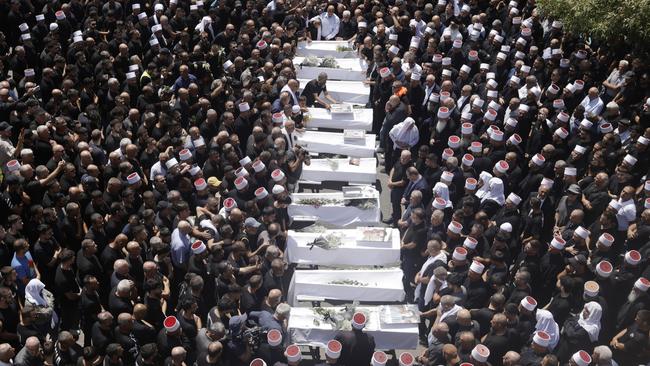
US and Middle East diplomats were scrambling to prevent an all-out war between Israel and the powerful Lebanese militia Hezbollah as burials began for the 12 children killed by a rocket fired from Lebanon.
Israel threatened a forceful response to Saturday’s strike on the Israeli-annexed Golan Heights, with its military already striking several targets deep in Lebanon on Sunday.
As many in Lebanon braced for an Israeli strike, the country’s Middle East Airlines delayed the return of some of its flights on Monday.
Hezbollah, which controls southern Lebanon and has a strong presence in east Lebanon’s Bekaa Valley bordering Syria, said it had nothing to do with the deaths at Majdal Shams but claimed responsibility for a series of other attacks in the area on Saturday, including launching a rocket at an Israeli military site a few kilometres from the strike scene.
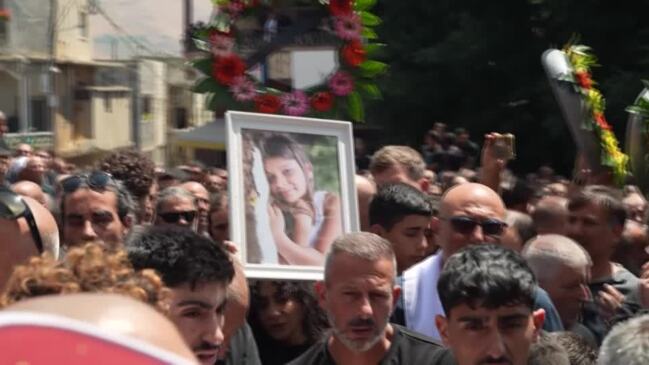
Israel’s military said an Iranian-made Falaq-1 hit the soccer field on which the children and teenagers were playing and that it was launched from the nearby southern Lebanese village of Chebaa.
US officials contacted their counterparts in Israel and Lebanon and traded messages with Iran to try to de-escalate the situation. All sides have indicated they aren’t interested in widening the conflict, but chances of a miscalculation remain high.
The White House National Security Council said on Sunday (Monday AEST) that American “support for Israel’s security is ironclad and unwavering against all Iran-backed threats, including Hezbollah”.
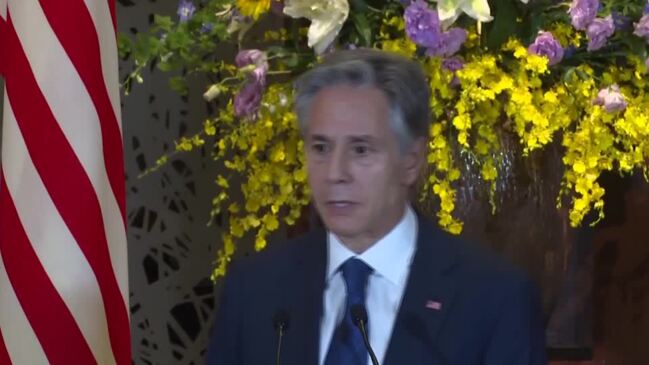
Secretary of State Antony Blinken said it was important to prevent the situation from escalating. “We’re in conversations with the government of Israel. And again I emphasise its right to defend its citizens and our determination to make sure that they’re able to do that,” Mr Blinken said in Tokyo.
“But we also don’t want to see the conflict escalate. We don’t want to see it spread.”
The Saturday strike also injured about 40 people, the Israeli Prime Minister’s office said. The rocket carried a 50hg warhead, an unusually heavy payload, Israel’s military said.
“We are approaching the moment of an all-out war against Hezbollah and Lebanon,” Israeli Foreign Minister Israel Katz said soon after the strike. The attack “crossed all red lines, and the response will be in accordance”.
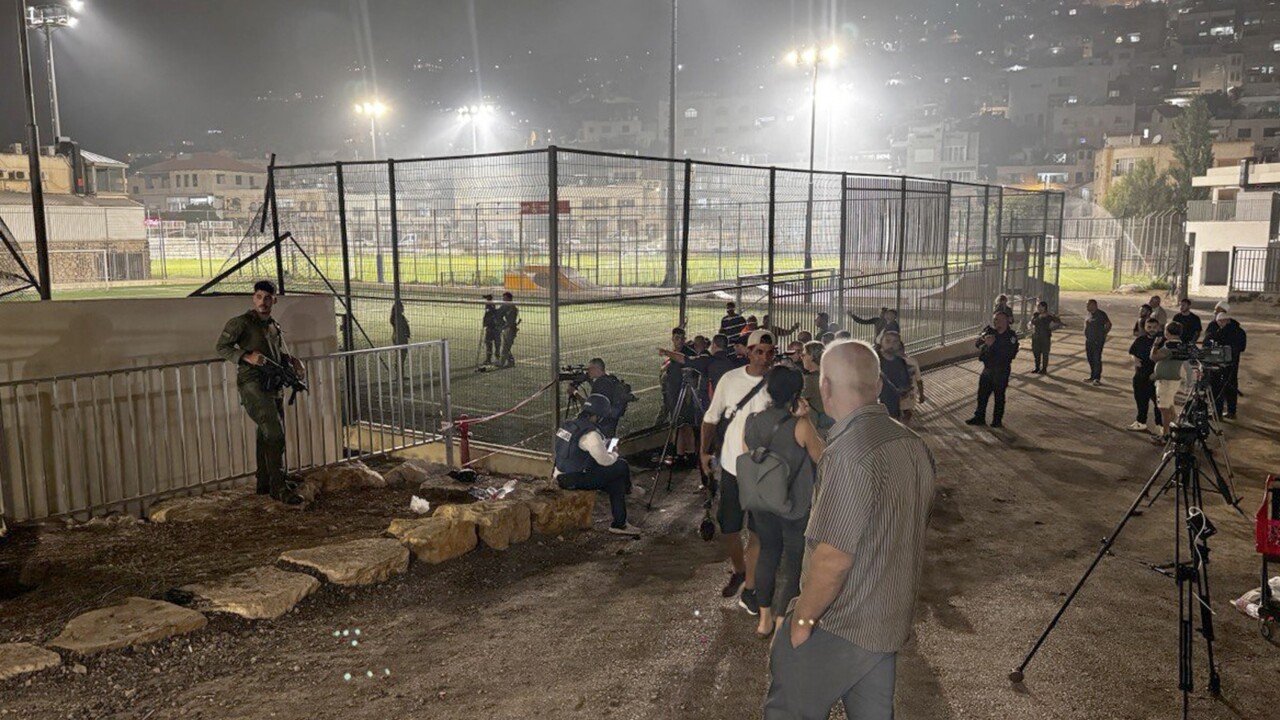
The Israeli military said the strike on Saturday was the single largest civilian casualty event in Israel since October 7, when Hamas killed 1200 people in the south of the country and took 250 people hostage, according to Israeli authorities.
The attack triggered Israel’s continuing war in Gaza, where health authorities say 39,000 people have been killed, most of them civilians.
The cross-border exchanges of fire have largely been limited to the border area, but Israel has repeatedly struck deep inside Lebanon.
Hezbollah is also deployed in Syria, where for years it has been fighting in support of President Bashar al-Assad in his country’s civil war.
War monitor Syrian Observatory for Human Rights said pro-Iran groups and Hezbollah-affiliated fighters had “evacuated their positions” south of the capital and in the Damascus countryside, as well as in parts of the Syrian-controlled Golan Heights, in anticipation of “potential Israeli airstrikes”.
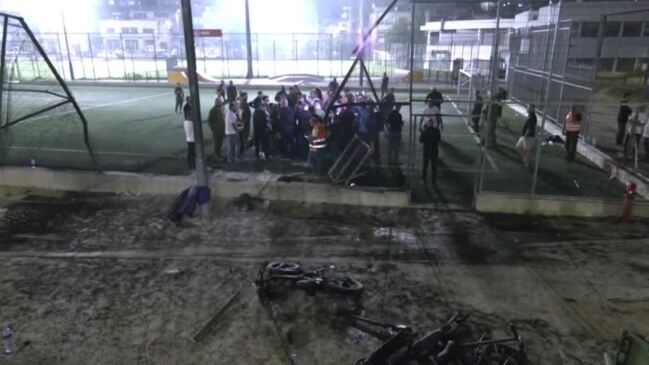
Iran draws red line to defend Hezbollah
The strike comes at a critical time for US-led efforts to secure a ceasefire deal in Gaza. An escalation between Israel and Hezbollah could disrupt those negotiations, which have been stalled for months but are set to resume this week in Rome.
Top officials are planning to attend the latest round of talks, including CIA director William Burns, Israeli spy chief David Barnea, Egyptian intelligence chief Abbas Kamel and Qatari Prime Minister Mohammed bin Abdulrahman al-Thani.
Israel and Hezbollah have been exchanging cross-border fire since the Hamas-led assault in October. Hezbollah has said it wouldn’t agree to a ceasefire until fighting ends in Gaza.
Until now, Israel and Hezbollah had managed to keep the conflict within limits, but Saturday’s strike was exactly the kind of incident that could escalate the fighting into war.
Hezbollah is Iran’s most important asset in the Persian Gulf state’s regional array of militant-group allies.
Iranian security advisers have said an Israeli attempt to destroy Hezbollah, especially by launching a land invasion, would be the red line that could bring a direct Iranian intervention into the conflict.
Iran has only carried out a direct strike against Israel once, a barrage of more than 300 missiles and drones in April.
The Wall Street Journal






To join the conversation, please log in. Don't have an account? Register
Join the conversation, you are commenting as Logout